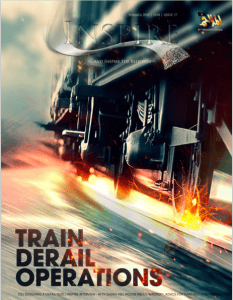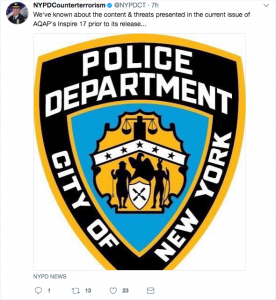Al Qaeda in the Arabian Peninsula (AQAP) has released the 17th edition of its Inspire magazine, in which the group calls on supporters to strike trains in the US and Europe.

The editors of Inspire say that followers can choose from one of three modes of attack. They can directly target the train from “either inside or from outside,” or target “the rail itself so as to derail the train,” or assault train stations, which “are always crowded and cause major interruption towards the transportation system.”
The latest issue of Inspire focuses mainly on the second means of attack, providing readers with step-by-step instructions for building a train derailment device. An 18-page guide to building a derail tool is included in the 97-page electronic magazine and signed by the “AQ Chef,” a name that has been attached to previous AQAP ideas, such as a how-to guide for building bombs that was published in Inspire years ago. The “AQ Chef” claims that the magazine’s “train derail” design is similar to the “industrial” tool “used by the track management staff” when they need to derail a train with faulty breaks.
The instructions begin with the building of a mold and end with the construction of a metal derail device. “We will keep away from using any electronic tools or tools that are specially used in construction…so as to remove any traces for suspicion,” the do-it-yourself guide reads.
This “weapon” has several advantages, according to AQAP. It is “[e]asy to design” and easy to “hide your tracks from forensics after the operation.” It will supposedly befuddle security agencies and leave the enemy “confused and disoriented.”
Interestingly, AQAP touts the fact that this type of “operation” does not require “martyrdom” and therefore “can be repeated.”

Hours after the new Inspire magazine was released online, the New York Police Department (NYPD) Counterterrorism Bureau responded with a series of messages on its official Twitter feed.
“We’ve known about the content & threats presented in the current issue of AQAP’s Inspire 17 prior to its release,” one NYPD tweet, seen on the right, reads. “Our robust multi-layered counterterrorism apparatus is designed to protect our air, land, waterways and railways in #NYC,” another tweet reads.
AQAP touts potential economic damage
Al Qaeda has long argued that its attacks and guerrilla warfare are intended to wear down the West, in part by driving up the costs of security and waging war. The adjustments made to airline security since the Sept. 11, 2001 hijackings have been costly. Al Qaeda’s failed attempts to bring down airliners in the years that followed have also driven costs up.
In this vein, AQAP has repeatedly promoted the detrimental economic effects of its operations. In 2010, for instance, Inspire’s editors claimed that the $4,200 spent on an attempt to blow up cargo planes forced the West to spend billions of dollars in additional security. This made the operation effective even though no one was killed and the plot was thwarted, according to AQAP. [See FDD’s Long War Journal report, AQAP releases a ‘special issue’ of Inspire magazine.]
Similarly, Inspire’s authors tout the intended economic impact of their plan, pointing to the large numbers of passengers carried on commuter trains and the valuable freight that is often transported by rail. One page summarizes the main “passenger train routes in America,” while another displays a map of “US railroad lines by ownership.”
“O Mujahideen,” AQAP’s men write, “it is time that we instill fear and make them impose strict security measures to trains as they did with their Air transportation.” Train derailments will “[c]ontinue to bleed the American economy [with] more losses, increase the psychological warfare and make it worry, fear and weaken much more.”
“We have to expose more of their vulnerabilities in their security,” Inspire’s editors explain. “And when they spend millions of dollars to tackle a vulnerability we should be ready to open a new [one] – by the strength of Allah.” In this manner, the jihadists claim, “we can make their economy bleed and wage a psychological warfare by breaching vulnerabilities in their security.”
AQAP’s editors recognize that most derailments don’t cause significant damage, but they argue that some accidents caused by train derails have been especially costly. Moreover, it is very difficult for authorities to protect the extensive railroad system, making it a prime target for disrupting the American economy.
To make their case, Inspire’s authors point to a 2004 report authored by the United States General Accounting Office (GAO). “There are over 100,000 miles of rail in the United States,” the report’s authors noted. “The extensiveness of the infrastructure creates an infinite number of targets for terrorists.”
Even so, Inspire’s authors warn followers that “railroad management staff still have some security measures” in place, including the regular deployment of “a rail inspection car on the railroad so as to inspect the rails.” AQAP says the “Lone Mujahid” can “overcome this security measure” by placing “the derail tool on the rails approximately 10 minutes before the train passes by.” The jihadist should also be “well aware of the timing and schedule of the train,” including the “route the targeted train will take.” This “information is widely and publicly available for all.”
Al Qaeda has targeted trains in the past
Targeting trains is hardly a new idea, of course. On Mar. 11, 2004, al Qaeda-affiliated terrorists placed ten bombs in backpacks and bags on board commuter trains in Madrid, Spain, killing 191 people and wounding nearly two thousand more.
In 2009, US officials thwarted an al Qaeda plot against commuter trains in the New York City area.
In 2013, Canadian authorities arrested two men who were plotting to derail trains traveling between Toronto and New York City. Canadian officials determined that the two jihadists, who were subsequently convicted on terrorism charges, received “support from al Qaeda elements located in Iran” in the form of “direction and guidance.”
In addition to trains and planes, al Qaeda has also attacked other transportation nodes in the past. The July 7, 2005 London bombings, which are referenced in the new edition of Inspire, targeted commuters during rush hour.
Other al Qaeda figures promote “Lone Jihad” attacks in Inspire
Inspire features commentary from several prominent jihadist figures, including Hamza bin Laden, the son of the al Qaeda’s founder. The terrorist publication includes the text of Hamza’s “advice for martyrdom seekers in the West,” which was released in May.
An essay by former Guantanamo detainee and current AQAP leader Ibrahim al-Qosi is titled, “imminent threat…” Al-Qosi, who worked for Osama bin Laden prior to 9/11, praises the “fear, terror and death” caused “by new creative and destructive Lone Jihad operations,” which are “executed by men from your own homeland.” Al-Qosi explains the logic behind such attacks, saying that they are carried out by “[m]en whose boots have not touched the lands of Jihad in Afghanistan or Sham and whose names have never been in the FBI or CIA black lists.” In other words, “Lone Jihad” operations do not rely on jihadists who may have been detected by authorities because of their suspicious travels.
In another piece, Ibrahim Ibn Hassan al-Asiri, a senior AQAP leader and bomb maker, explains “the importance of focusing on specific kinds of targets” in the transportation sector. Al-Asiri is a notorious explosives specialist and is suspected of crafting some of AQAP’s clever devices, including the underwear bomb used in a failed bombing attempt on a Detroit-bound plane on Christmas Day 2009. Al-Asiri calls on his “Mujahideen brothers everywhere, especially the Lone Jihad heroes” to follow in the footsteps of various terrorists. “Target America,” he advises.
Inspire also includes a lengthy interview with Al Qaeda in the Islamic Maghreb’s (AQIM) emir, Abu Musab Abdul Wadoud (a.k.a. Abdelmalek Droukdel). Like the others, Wadoud stresses the efficacy and necessity of “lone” jihadist attacks. “This method of jihad is one of the modes of conflict between us and the West – something both new and old – a way of hemming in the enemy and breaking its strength, and this mode of asymmetrical warfare was pioneered by our predecessors centuries ago,” Wadoud says. “The Lone Jihad has proven its effectiveness and ability to repel aggression.”
As FDD’s Long War Journal previously reported, the Islamic State has had more success than al Qaeda in inspiring or guiding “Lone Jihad” operations in recent years, despite the fact that AQAP was a key innovator in this regard. This has forced AQAP to praise a string of attacks carried out in the Islamic State’s name, even though AQAP opposes Abu Bakr al Baghdadi’s so-called caliphate. In the latest edition of Inspire, AQAP continues to laud operations claimed by the Islamic State and its supporters, such as the June 2016 Orlando massacre, the July 2016 truck assault in Nice, France, the September 2016 attacks in the New York-New Jersey area and Minnesota, as well as the March 2017 terrorist incident near the British parliament in London. In a number of cases, “lone jihad” terrorists were first exposed to AQAP’s ideas but later claimed that they acted on behalf of the Islamic State.
Al Qaeda is attempting to regain the initiative with respect to “lone jihad” operations. In May, AQAP leader Qasim al-Raymi released a lengthy plea for more attacks in the West. Al Qaeda quickly followed Al-Raymi’s message with the aforementioned speech by Hamza bin Laden.
And the latest edition of Inspire is intended to further buttress these efforts, with multiple al Qaeda figures praising the “lone jihad.”








3 Comments
When I was in the 6th grade, an FBI agent came to our school and gave a speech and also told us how to derail a train , among other ways of sabotage , including building an explosive device . This took place in El Paso Tx, as I was a military dependent, but attending a off post (Bliss) civilian grade school at the time, lets say 1959 ish.
Bin Laden focused on them. Saif Al Adel focused on them (train derails)
These guys are nothing if not persistent/consistent/patient (understaffed?)
It’s like sabotage behind enemy lines w a side of spook tactics.
Zap the people who make and read this rag.
For the cost of a few of those overrun districts we keep reading about in the news, Or for the cost of corruption in Afghanistan for a year and a half, we could modernize the tracks and install devices that can monitor the tracks and prevent many future accidents.